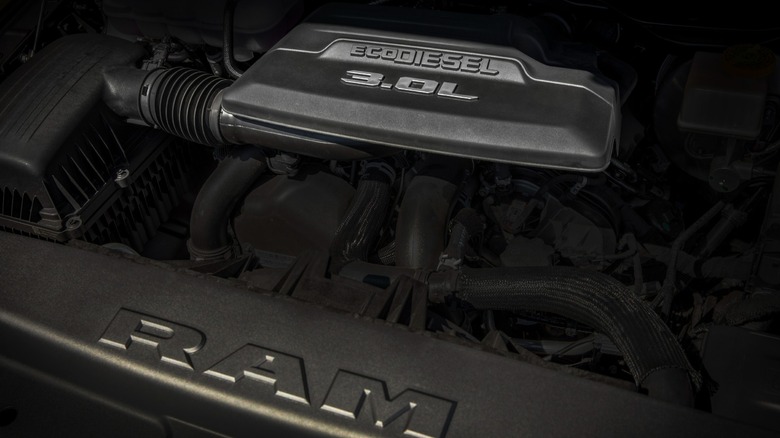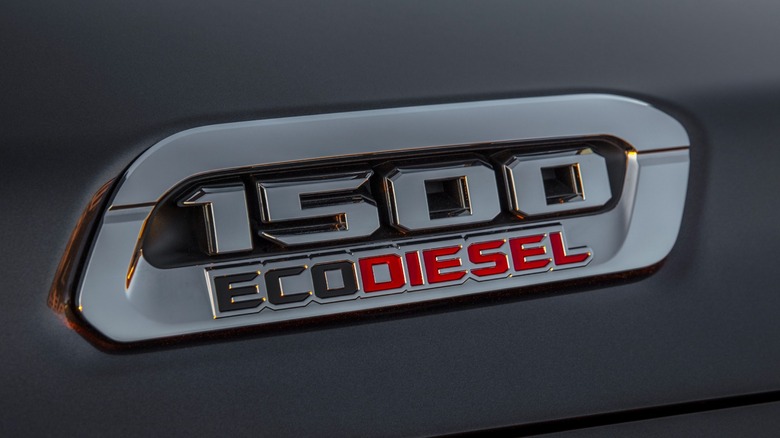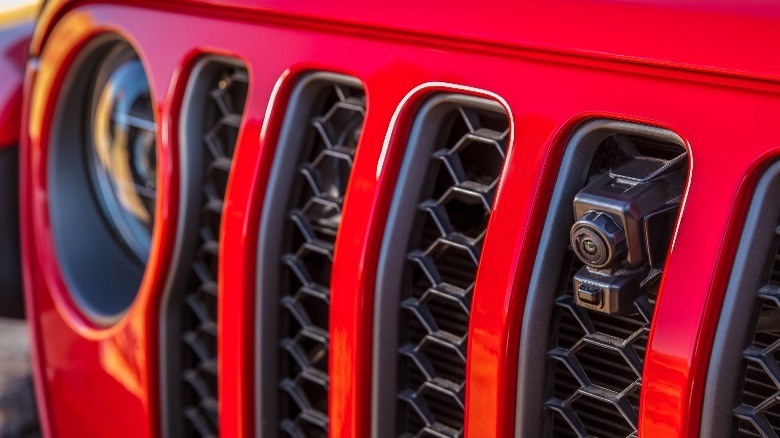Is The Chrysler 3.0L EcoDiesel A Good Engine? Here's What Owners And Mechanics Say
With their fuel-efficiency advantage over gasoline engines of similar capacity, it is odd that diesel engines haven't been offered often in modern light-duty vehicles. Therefore, when Chrysler introduced the 3.0-liter EcoDiesel V6 as an option for the 2014 Ram 1500 pickup and Jeep Grand Cherokee, it was a bit of an anomaly, albeit a welcome one to those who wanted an efficient engine with low-end grunt in a half-ton truck or sport-utility vehicle.
The second-generation (but first to be offered in the United States) 3.0 EcoDiesel V6 was produced by Italian manufacturer VM Motori, delivering 240 horsepower and 420 lb-ft of torque, 28 highway miles-per-gallon, and paired with an eight-speed automatic. The EcoDiesel option in the Jeep Grand Cherokee was retired in 2019. The third-generation 3.0 EcoDiesel V6 was introduced in 2020, with output increasing to 260 horsepower and 480 lb-ft of torque. It was made an option for the Jeep Wrangler and Gladiator, but as electrification became a mandatory direction for all automakers in the face of new fleet fuel-economy and emissions standards, the EcoDiesel was phased out entirely after the 2023 model-year.
The critical reception of the EcoDiesel V6 was generally positive to start, with Edmunds in its review of the 2014 Ram 1500 stating, "Sure, it doesn't have 800 pound-feet of torque (only 420 lb-ft) like the Big Daddy trucks, but man is this thing smooth and quiet." However, its reputation amongst owners and mechanics after 10 years of availability in the United States is a bit of a mixed bag.
The second-generation Chrysler 3.0-liter EcoDiesel V6 was efficient and unreliable
The availability of a diesel engine in lighter-duty vehicles was a boon for truck buyers when the EcoDiesel V6 was introduced by Chrysler in 2014 and available through the 2019 model year, with MotorTrend even awarding the Ram 1500 with the EcoDiesel its 2014 "Truck of the Year" trophy. Unfortunately for owners and for Chrysler, their relationship with the second-generation EcoDiesel went from sweet to bittersweet as years and miles were added to its history.
One of the most commonly-reported problems with the second-generation EcoDiesel, according to RepairPal, is cracking of the EGR (exhaust gas recirculation) Cooler. This can allow combustion inside the intake manifold, which is a fire hazard. Chrysler issued a recall for this issue, but not all owners are diligent in having recalls performed by a dealer.
Another common issue with the second-generation EcoDiesel is bottom-end failure. An experienced diesel-engine mechanic from the YouTube channel The Getty Adventures states that lugging the engine stresses the motor's crankshaft, causing it to flex and the main engine bearings to fail. Carbon buildup in the oil passages to the main bearings, cutting off their lubrication source, eventually resulting in a catastrophic engine damage.
With these common problems, along with several engine recalls, Chrysler decided to make some major changes with the next generation of 3.0-liter EcoDiesel it would introduce in 2019.
The third-generation Chrysler 3.0-liter EcoDiesel was redesigned for 2020
The third-generation Chrysler 3.0-liter EcoDiesel was introduced for the 2020 model-year, and featured 80% new internals –including a new high-low pressure EGR system –a must given the issues in the previous generation. In addition, an updated variable-geometry turbocharger promising better efficiency, intake ports that were redesigned for better airflow, and a lower compression ratio to help deal with emission issues that resulted in a recall of the previous generation motor.
While the third-generation of the EcoDiesel has not been on the market for nearly as long as its predecessor, there are reported issues with it that could give a potential owner pause. Low oil pressure is an issue reported in EcoDiesel-related forums like 5thGenRams, where member EcoFan writes, "I called the dealership to let them know that the instrument panel warning came on indicating that the engine was experiencing low oil pressure...It was towed in. Pressure sensor replaced. Drove it home. Turned it off in the driveway and restarted it. Immediately the low pressure warning came on again."
Another issue with the third-generation EcoDiesel is the Bosch CP4.2 fuel pump, which can experience a failure, resulting in metal fragments traveling into the fuel lines and damaging components downstream. In 2023, Chrysler issued a recall to address this issue in the affected Ram 1500, Jeep Wrangler, and Jeep Gladiator vehicles equipped with the third-generation Chrysler 3.0-liter EcoDiesel.


